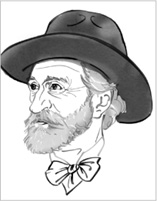

How can you stand a good chance of achieving something truly remarkable in your life? Devote yourself body and soul to just one thing. Be as demanding of yourself as you can be, and never stop striving for perfection. One frequent characteristic of exceptionally successful people is that they are very tough on themselves. They never tire of raising the bar ever higher; they focus on reacting to constant social, economic, and technological changes; and they continue developing throughout their life.
Giuseppe Verdi (1813–1901) provides a wonderful example of this kind of attitude. He rose from modest origins and thanks to his precocious talents, he had the good fortune to find a patron, Antonio Barezzi. This enabled Verdi to take music lessons, first in his hometown of Le Ron-cole and then, from 1832, in Milan, where he began his career as a composer of operas in 1839.
Just three years later his opera Nabucco enjoyed tremendous success. Bursting with energy, Verdi went on to write another 12 operas for various theaters before 1850. His masterpiece Rigoletto marked the peak of his glorious creativity in 1851, and the triumphant success of its premiere in Italy was repeated in other countries as well. Ever since, Rigoletto has been one of Verdi’s most frequently staged operas. Yet in spite of this great success, Verdi was desperate to achieve more, having set himself the goal of writing the perfect opera.
After Rigoletto he went on to write other famous works, including Il Trovatore (1853), La Traviata (1853), Don Carlos (1867), and Aida (1871). At 74 years of age—living at a time when even healthy men could not expect to survive beyond 60—Verdi gave the world his masterpiece Otello, seemingly crowning what his contemporaries deemed a more than accomplished career. Then, in 1893, at the age of 80, no less, Verdi wrote his last opera: Falstaff—a work full of vitality and zest for life. When asked why he, a famous man considered one of the most highly regarded opera composers of the nineteenth century, had once again taken on the exacting task of writing another opera at such an advanced age—and Falstaff, an extremely demanding work at that—he replied: “All my life as a musician I have striven for perfection. It has always eluded me. I surely had an obligation to make one more try.”1
Peter F. Drucker, the greatest and most influential management thinker of our time, was familiar with Verdi’s words and described how deeply they affected him as a young man: “I have never forgotten these words—they made an indelible impression on me. . .. [Aged 18 at the time,] I had no idea what I would become. . .. It was not until 15 years later, when I was in my early thirties, that I really knew what I am good at and where I belong. But I then resolved that, whatever my life’s work would be, Verdi’s words would be my lodestar. I then resolved that if I ever reached an advanced age, I would not give up, but would keep on. In the meantime, I would strive for perfection even though, as I well knew, it would surely, always elude me.”2
The interesting thing about Verdi is that he was perfectly aware of his achievements. His successes earning him substantial public acclaim, but all the same he strove to make his next work even better. In the same vein, when Drucker was asked which of his books he considered to be the best, he sometimes gave the coquettish response: “The next one.”
Do you see how both these men differed from the norm by setting the bar higher than the vast majority of other people? Verdi not only wanted to write popular operas, but he wanted to write a perfect work, the value of which might well be beyond the ability of his contemporaries to appreciate. People like Verdi and Drucker believed that even the greatest of accomplishments could be topped.
Perhaps Verdi was modeling himself on Phidias, the greatest sculptor in Ancient Greece, who in around 440 BC created the statues for the pediments of the Parthenon in Athens. When Phidias presented his bill to the city’s accountant, the comptroller refused to pay it, saying: “These statues are standing on the roof of the temple on the highest hill in Athens. We can only see their front. Yet you are submitting a bill for fully completed statues, including their backs, which nobody can see.”
“You are mistaken,” Phidias retorted; “the gods can see them.” Whether the gods were duly enchanted by Phidias’ statues or Verdi’s operas is a question we cannot answer, but we can say this: 2,500 years later the statues are still standing and have elicited wonderment from many subsequent generations, as have Verdi’s operas.
As is pointed out above, the thing that makes Verdi, Phidias, and Peter F. Drucker stand out is the high demands they placed on themselves. They both had a guiding star they doggedly followed for many years. During that time, their characters matured, but they did not grow old inside. They all produced work that shone well above the average, and they all yearned for perfection.
![]() Strive for perfection in your work—even if you know that you can never attain it.
Strive for perfection in your work—even if you know that you can never attain it.
![]() In what domain do you aim to achieve perfection in the long run?
In what domain do you aim to achieve perfection in the long run?